Peter MALONE
Christiane F
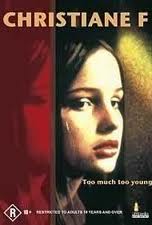
CHRISTIANE F
West Germany, 1982, 118 minutes, Colour.
Natja Burnkhorst, Thomas Haustein, David Bowie.
Directed by Uli Edel.
Christiane F. has been hailed as a serious look at the drug problems amongst youngsters in West Germany in the '80s. It is based on a series of articles appearing in the popular paper 'Stern'. The film is certainly grim in its presentation of Christiane's life, Berlin and housing, the streets, the railway stations - especially as centres for Pick-ups, prostitution and drugs.
The film, on the other hand, is long and repetitive. There is little explanation given for Christiane and her background. The film suggests many aspects but seems to rely on audiences supplying their own knowledge of social situations in the cities, in the family, at schools, amongst the peer group, in the cabarets. The background of the drug culture is given quite vividly - even alarmingly. There is also the atmosphere of contemporary culture, symbolised by David Bowie's songs and his concert. The seamy side of robberies, prostitution and drug deaths are to the fore.
For some the film may be shocking; for others it may highlight the social needs; for others it is on the level of popular cinema or very popular press and magazine stories which seem to sensationalise, or, at least, worry people without suggesting ways of coping with the problems.
1. The impact of the film? Themes? Treatment? The kind of response elicited? The intentions of the film? Serious? Exploitive? The background of the 'Stern' articles? At what level of study, communication? The authenticity of the film? The equivalent of newspaper reporting? Message? Mirror on contemporary German society?
2. The film as a product of West German film industry, 1980s? Colour photography, the atmosphere of Berlin: the cabarets and the darkness, the David Bowie concert - and Bowie as symbol of this sub-culture, the high rise apartments, the streets, the railway station? The atmosphere of a youth sub-culture? Drug and prostitution sub-culture?
3. The comparison with the day-to-day world: was enough of ordinary Berlin life presented? Or was it the limited picture of Berlin from Christiane’s point of view? The presentation of parents, family separations, relationships, teachers, health, the police? The ordinary wag of life of Berlin? The ordinary world as perceived by the group? Did the film indicate reasons for the alienation of Christiane and her peers from the ordinary world?
4. The atmosphere of Berlin? Values, morals, aims, peer group pressure, enjoyment, escapism, responsibility? The disco world? Belonging? Sounds, music, lyrics? Pressures? Comparisons? The importance of drugs - taking them, the feelings, addiction? Sex? Communication, age? What did the problems mean, what did they stand for? The symbolism of the kids on the roof looking down on the police?
5. The structure of the film: the cumulation of episodes, the repetitiveness of the style, the overall effect of this glimpse of the sub-culture youngsters trapped in this world, the ugliness, the depression?
6. Christiane as character: her age, relationship with her mother, the break-up of her mother's marriage, the live-in friend and his gift of the Bowie record? The style of the apartment? Her voice-over comments on boredom school? Recreation, the cabaret, her goals? Friends and their pressure? Her observing of people? People interesting her? The
discovery of drugs and her decision to try them? The foiled attempts? Her attraction towards Dieter - his attraction, his rejection? His warning against drugs but his own addictions? The other friends? Her trying the drugs? Repetition? Her being caught? Her lies to her mother? Her young friends and their addictions - deaths? Her going to Dieter’s apartment, the growing friendship, the sexual liaison? The lies and the repercussions? Her tiredness - especially in school? The pressure for the need for drugs and the whole focus of life?
7. The change in her behaviour, personality? The drug habits, feelings? Compassion for the other girls? Dieter and his story? Her moving into prostitution to raise the money - and the focus on the degrading situations?
8. The scenes of drug-taking, shooting up, the poor quality drugs, the syringes, the blood? The clinical detail? The long sequence of Dieter and Christiane's 'cold turkey' experience, vomiting, spasm etc.? Their immediate relapse?
9. The deaths and the newspaper headings? The police and their inability to cope? The need for money , prostitution? The frequent scenes at the railway station and the boys lined up for their clientele? The range of clientele? The descriptions of sexual behaviour?
10. Dieter and his patron, his lying about the sexual relationship, his looking to the patron for protection, Christiane's going to the home and discovering the two and their sexual activity? Her disillusionment?
11. The life of dead-ends in such society? The aftermath with Christiane's rehabilitation? How well-founded were the hopes for such rehabilitation?
12. The quality of perception of experience, human characters? The social problems? The relevance of the film to countries outside East Germany?
Chosen Survivors
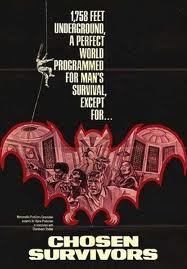
CHOSEN SURVIVORS
US, 1974, 98 minutes, Colour.
Jackie Cooper, Alex Cord, Richard Jaeckel, Bradford Dillman, Diana Muldaur.
Directed by Sutton Roley.
Chosen Survivors is expanded T.V. material, enjoyable in its way without being outstanding. The screenplay combines nuclear power science-fiction, the group disaster genre and the fearsome animals (this time, vampire bats), so there is plenty to discuss.
1. The implications of the title for science-fiction and the nuclear atmosphere of the film? The elitist overtones? An apt title for this film?
2. How impressive was the opening of the film? The nuclear holocaust atmosphere, the slow-motion photography of the survivors, the going down under the earth? Did the structure of the film follow this opening? The nuclear atmosphere changing to animal science-fiction and horror? Did this produce a satisfying entertainment, with interesting implications?
3. What did the film have to say about governments using people? The choice of these survivors. the programming of their life underground? What was your reaction to their being taken? Being forced to see the nuclear destruction, being observed by the behavioural psychologist? Did you share their reactions to this situation? How ironic was it when it was discovered not to be true?
4. How well observed and acted were the interaction scenes between the survivors? Why didn't they react according to program? The details of their behaviour - were they predictable? Why? The irony of Mc Comber observing them? The nature of the program made for them with its bland television sweetness and light? Your reaction to this? Do governments have the right to do this?
5. What was your response to the elite group who were chosen to survive? Is this the mark of a Fascist government and a destruction of human rights? The criteria for the choice of these survivors?
6. How central was the character of Raymond Couzins? Why was he so repellent? The businessman without money? Using his 'hard-deal' personality with the others? His drunkenness and bitterness? His rape? Did you feel sorry for him? His lack of sense when decisions needed to be taken? His using money to get the black man to open the door? Did you feel he deserved the retribution he got? Why?
7. How central was the character of McComber? His observation of people's behaviour. seeming to be so cool? Did you suspect him of being an agent? Why did he break so badly when the situation crisis came? What comment was made on his profession.. his moral attitudes? Being a machine instead of a man? Did you feel he deserved the punishment that he got?
8. How interesting were the characters of the novelist and the Congresswoman? Were they conventional hero and heroine material? What did they contribute to the life underground? Their relationship to each other? Their future when they returned to ground? The impact of the experience on them?
9. Did any of the other characters emerge as fully developed personalities? Which? The scientists, the negroes? The strength of character needed for the negro to climb the shaft? Gordon Ellis as the technician? His response to the situation? Was audience sympathy with him?
10. After discussing these characters and their situation, sum up the rights and wrongs of the whole situation in terms of government policy and the use of people's lives.
11. Did the film change successfully with the introduction of the bats? Was this too abrupt a change? How successful a horror film was the section with the bats? Why? Audience reaction to the ugliness of bats, vampire bats? Was this credible?
12. How successful was the generation of suspense and thrills and urgency with the bats? Ellis's trying to detect their entry, set up protections, the dimming of the lights, the eerie entry of the bats, their destroying their victims?
13. The suspense of the climb - how successful by this part of the film? The inevitability of the bats - was this well handled? The impact of the fall after the opening of the door? The response of the audience to this human achievement for saving others?
14. There were many deaths in this film. They were needless. Who was to blame? The responsibility of government for the failure of the plan? The irony of the T.V. plan and program still going blandly, with such disaster?
15. Was the end satisfying? What was the ultimate impact of this science-fiction film? Why?
Birds, The
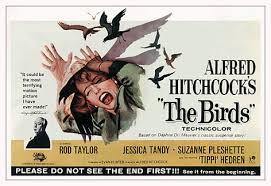
THE BIRDS
US, 1963, 119 minutes, Colour.
Rod Taylor, Jessica Tandy, Suzanne Pleshette, Tippi Hedren, Veronica Cartwright, Charles Mc Graw, Ruth McDevitt?, Vonnie Chapman, Karl Swenson, Elizabeth Wilson.
Directed by Alfred Hitchcock.
The Birds is one of Alfred Hitchcock’s most famous films and something of a classic – it is the archetypal story of animals menacing human beings without any given reason. Jaws and films like Jaws were the direct heirs of The Birds.
The film is based on a story by Daphne du Maurier who provided Hitchcock with stories from his last film in England, Jamaica Inn to his first film in Hollywood, Rebecca.
The film was made in the aftermath of Psycho and before Marnie. In Marnie he used Tippi Hedren whom he had introduced in The Birds when he was not able to get Grace Kelly to act. Tippi Hedren did not have a strong career – although her daughter, Melanie Griffith, was far more successful.
Rod Taylor is the strong star with good support from character actors, Jessica Tandy and Suzanne Pleshette.
The film was nominated for an Oscar for special effects. The atmospheric score is by Bernard Herrmann who wrote the score for a number of Hitchcock films including Psycho.
This was a period when Hitchcock was making a great deal of material for television – but The Birds stands out as his key film of the 1960s.
1. What were audience expectations of this film? As a horror story, a film about birds? How were expectations fulfilled or thwarted?
2. What were audiences expecting of a Hitchcock film? Suspense, the bizarre? fulfilled or thwarted? Why? Do the expectations prejudice the effect of the film?
3. How seriously was the film meant to be taken? The atmosphere of practical jokes at the start, good and evil, omens, human beings and nature, human foibles, terror and violence?
4. Many commentators see the film as very serious in its underlying techniques. They speak of unexplained and merited evil? Menace, destruction? Humans and nature with people fleeing? The world of good and evil? The effect on the world of evil?
5. Comment on the techniques of the opening, and the involvement of the audience: the credits, the modern atmosphere, the shock sequences, the joke about the birds, Melanie. Melanie as good or evil, a Jonah bringing disaster, Mitch and the court sequences, Mitch and the attack of the birds, the initial gestures of the birds and the human response? The atmosphere of San Francisco making the audience perhaps somewhat complacent?
6. The significance of the journey to Bodega Bay? The journey? Melanie’s purpose, malicious enjoyment? Concern for Mitch's sister? The fascination of Mitch? The significance of the town, its look, locations, its ordinariness? These aspects of the town, Annie, the Brenner Family?
7. The impact of the birds, their introduction? The fact that they were left out of consideration for some time? The focus on the family and its significance for the film? Lydia and the psychological relationship between Mitch and his mother? Cathy, the love birds? The relationship between Mitch and Annie? Melanie's intrusion into the family? The normality and yet the crises?
8. The initial impact of the bird attacks? The climactic build-up with few birds, then more? The puzzle about the birds, and who sent them? Such sequences as the birds in the fireplace, on the wires, in the playground etc? How did Hitchcock build up the menace of the birds?
9. How dramatic had the film become with the sequences of the school? the murdered man, the children, the attacks, Annie’s death, the need to rescue Cathy? How did this all prepare for the final siege and the escape? What was the meaning of all this upheaval and attack of the birds?
10. Comment on the techniques of communicating menace, the rescuing of Cathy and the walking past the birds in the school yard, the observation of the birds from on high? Viciousness, the attack ?)n Melanie, the death
of Annie? The sea itself, the, electronic music for the birds, their pecking through the walls? The final attack on
Melanie and the shock?
11. What was the relationship of the birds’ attack and their menace and punishment on evil? What effect did this have on each person? The change in Lydia and her attitudes, Mitch, Melanie and her way of life?
12. The importance of seeing Melanie as punished and rescued? The initial attack on Melanie in the boat, Melanie in the phone box, Melanie in the upstairs room?
13. How significant was the climax? The fact that the humans were allowed to escape? Their driving away? Many critics commented on the flatness of the ending. Do you agree? Why?
14. What values was the film exploring about human nature and the puzzle of the world in terns of an animal thriller?
Blood on the Moon
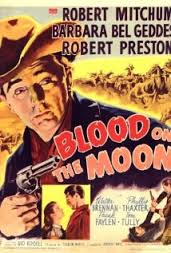
BLOOD ON THE MOON
US, 1948, 88 minutes, Black and white.
Robert Mitchum, Barbara Bel Geddes, Walter Brennan, Robert Preston, Phyllis Taster, Charles McGraw?.
Directed by Robert Wise.
A modest scaled Western directed by Robert Wise, a prolific director, however not noted for his Westerns. He made Tribute to a Bad Man in 1956. This is conventional material of war on the ranges over cattle and property. The film is notable for an early performance by Robert Mitchum giving his sturdy laconic presence. Robert Preston is the vociferous villain. Barbara Bel Geddes in an early film is a strong heroine and Phyllis Thaxter has a somewhat unsympathetic role. Average but quite well made.
1. Entertaining and interesting Western? The title and themes? Tone?
2. The conventions of the Western and how well used? Anonymous stranger riding in, changing people's lives and being changed? The ranchers and the farmers and their conflicts? Gunfighters, the Army, Indians?
3. Black and white location photography, studio sets? The score?
4. The familiarity of the plot contents? Satisfying for the purposes of the film? Realistic? The anonymous stranger, partnerships, cattlemen, farmers? The clashes of interests? The doublecrossing and deals? Heroism? Gun fights?
5. Robert Mitchum's style as the hero? The strong sturdy type, his manner of riding in and the encounter with the cattlemen. the confrontation with Alma and the shooting and her suspicions, his linking up with Riley? The seeing through Riley's scheme? His decision to help the farmers? Attraction towards Alma? The gun fights? The relationship with Chris and his help? Lupton's suspicions? The trick with the Army? Alma's following him? His being wounded, the inevitable gun fight with Riley, the happy ending? The conventional Western hero?
6. Alma as heroine? The initial shooting, her devotion to her father, suspicions of Jim, believing him, in love, following him? The shootout? The contrast with Carol and her love for Riley, betraying her father, her warning to Alma about being disappointed in gunfighters, the confrontation with Riley, her change of heart?
7. The minor characters on the side of the farmers, Lupton and his attitudes, the Army chief and his double deals, Chris and his son and his eventual help? The gunfighters? How well delineated?
8. Riley as villain - his persuasive speech, friendship with Jim, the gunfighters, his schemes and his using people especially Carol, his using Jim, willingness to kill? The shootouts? the final confrontation and his death?
9. The issues of the cattle Western, the land, deals, survival, pioneering?
10. Conventional material, memorable sequences? The themes of the American West and its heritage?
Brute, The
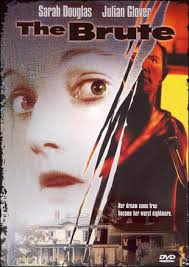
THE BRUTE
UK, 1977, 90 minutes, Colour.
Sarah Douglas, Julian Glover.
Directed by Gerry O’ Hara.
A mixture of social document and exploitation. When it was being made it was called The Brute Syndrome and purported to be a study of human relationships focussing on men who had psychological hang-ups and expressed them in brutal behaviour towards their wives. It also focused on bashed wives and their plight.
This comes through quite strongly although it is interspersed with themes more at home in a sexploitation film. It seems as if the film to aimed at the widest possible audience and as such is not too bad.
Sarah Douglas is an attractive heroine. Julian Glover, a good actor in so many films, is duly convincing as the brute. There is quite a lot of social observation - but it is generally of the popular magazine variety. The film asks to be judged at this level. It was directed by Gerry O' Hara who has made a number of low budget films over the years.
After this film he made the British- Canadian co-production, the romantic Leopard in the Snow.
1. The impact of the title? The original title was 'The Brute Syndrome'. Would this alter the impact - focussing on the psychology?
2. How well did the film portray the psychological elements of the problem? How much exploitive material was there? For what audience? What effect was the theme of brutality meant to have?
3. The significance of the preface, facts? Sympathies? The focus on Diane, on her husband?
4. Diane as the focus of the film, her suffering, brutality, the night in the garage, going to work, her covering up, the importance of the reconciliation, the further encounter with her husband, her bitterness? yet her love, leaving? The build-up to the reconciliation and the sudden switch with the attempt to brand her? Hatred, the build-up to the law
courts? Tim as a bond between the parents? Her regrets that the marriage did not succeed?
5. Diane as a person, strengths and weaknesses, work as a model, her relationship with the photographer, with Carrie, With Millie and her understanding of battered wives? Her response to him? Her work and her social interest? Sexuality and infidelities? The social aspect of her plight, the courts, decisions? The atmosphere of terror?
6. The importance of the interview with the psychologist? How credible? His analysis of the situation? His advice?
7. The character of her husband, an ordinary man, his behaviour as a brute? The importance of his mother and her hold over him? The short sequence with the mother and her minding Tim? His moods, inability to relate? His being charming and then the sudden transition? The initial
brutality, the appearance in the dress, slashing Diane's clothes, the branding sequence, his language? his change for public appearance?
8. Carrie and her boy friend and their helping Diane? Sexuality? The photographer's lust and parking his car and Carrie's reaction? Their help? Discussions of marriage and their decision not to marry because of the ugly models?
9. The sequences of Millie and Allan - how credible and authentic? Brutality, assault, drunkenness? Allan and his friends and his demand, ridicule of his wife? The home for the wives? The situation to help Millie escape with her baby?
10. The contrast of the scenes with Tim and their effect? South Africa and the husband going there?
11. The build-up to the car chase as a symbol of the mutual attack and fear?
12. The husband's attitude towards the court, the brand? The dredging of the river and finding it?
13. The recapitulation and its effectiveness at the end of the film?
14. The value of this kind of film an entertainment, for a wide audience? How much psychological insight, at what level, to what effect?
Best Foot Forward
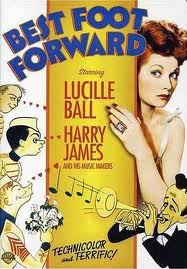
BEST FOOT FORWARD
US, 1943,94 minutes, Colour.
Lucille Ball, William Gaxton, Virginia Weidler, Tommy Dix, June Allyson, Gloria de Haven, Nancy Walker, Chill Wills.
Directed by Edward Buzzell.
One of the earliest M.G.M. musicals in colour and a war morale boosting effort. It was produced by song-writer Arthur Freed who was bringing many Broadway hits to Hollywood. He also produced such films as Yolanda And The Thief and The Ziegfeld Folies before branching out into more creative musicals with such directors as Vincente Minnelli and Gene Kelly and Stanley Donen, An American In Paris, Singin' In The Rain, The Bandwagon. This is a pleasant, if very dated. musical (although Grease in the seventies would seem to be a direct descendent in both content and style).
The New York cast was transplanted to Hollywood but only a few of the cast were to succeed immediately, especially June Allyson and Gloria de Haven. Child star of the thirties and forties, Virginia Weidler, has a featured role and is entertaining in the straight-faced comic heroine style. Nancy Walker makes a big impact with her zany comic presence but she was not to be a success on the screen until her television career with such series as McMillan? And Wife. (She was later to direct the Village People in Can't Stop The Music.)
The star of the film is Lucille Ball playing herself on a publicity stunt, going to a military college for a Prom night. She gets into all kinds of scrapes, managing to keep her dignity as well as offering a number of wisecracks and even singing a ballad to the teenage hero! There is also a comedy role for Chill Wills. Since most of the action is dance, Harry James and his orchestra receive a great deal of prominence - Harry James even trumpeting The Flight Of The Bumble Bee.
There are some bright songs, not particularly memorable, and a lot of vigorous dancing choreographed by Charles Waters who was later to make his mark in a number of musicals especially his first, a college musical, Good News. Not to the tastes of later decades, but interesting as reflecting the popular styles of the M.G.M. musicals of the forties.
Bigger Than Life
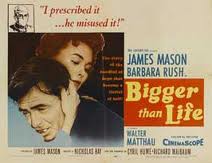
BIGGER THAN LIFE
US, 1956, 95 minutes, Colour.
James Mason, Barbara Rush, Walter Matthau, Robert F. Simon.
Directed by Nicholas Ray.
Bigger than life was a cautionary tale from the mid-1950s, geared for a wide audience, presented in Cinemascope and colour with a very sympathetic star in James Mason who had made quite an impact in England in the 1940s, had a successful career in Hollywood in the 1950s including a number of swashbuckling films but, especially, in his Oscar-nominated performance with Judy Garland in A Star is Born.
The story is particularly relevant to later decades. This was before any thalidomide scares or other investigations into the use of drugs without testing.
James Mason portrays a teacher, with a family, who has severe pain, blackouts and is diagnosed with an inflammation of the arteries, a rare disease. He is given a limited time to live. He then agrees to experimental treatment of cortisone. While he makes a recovery, he keeps taking the tablets to prevent the illness recurring. However, he begins to be adversely affected, overusing the tablets and experiencing mood swings.
The film is careful in its final conclusion – and does not satisfy a generation which is very much used to litigation about drugs and their suitability to be on the market.
James Mason is very good in the central role. Barbara Rush is his sympathetic wife. This is an early film for Walter Matthau.
The film was directed by Nicholas Ray who began his directing career very effectively in the late 40s with They Lived By Night and Knock on Any Door. He made a number of conventional thrillers and action films in the early 1950s but also made the classic western, Johnny Guitar. Again he made an impact with his Rebel Without a Cause.
In the 1960s he made a number of wide-screen spectaculars including The Savage Innocents, King of Kings and 55 Days at Peking.
1. What did the title mean and to whom did it refer? How? Its relationship to drugs and addiction?
2. How powerful would this drama have been for the mid-fifties? Its message about drugs and addiction? What impact does it have today, our being used to drugs?
4. How was the ordinary family setting established in the film? Eddie at his work? His wife and his relationship to his son? Their ordinary way of doing things? Typical middle Americans? How important was this ordinary family setting for the drama which was to ensue?
5. How did this help audience identification and their receiving of the message?
5. What kind of person was Ed? An ordinary man, a teacher, well-respected, a good husband and father? The impact of his illness on him? The reality of his illness? The fear that it induced?
6. What comment on medicine and experimentation did the film make? The risks to be undertaken as regards drug treatment? Should Ed have taken the risk? What about his wife?
6. How did the film stress the good effects of the drug? In the cessation of pain and the control of the illness? Ed’s ability to live a normal life and do normal work?
7. Why did he become addicted? How did he become addicted? How was the effect of the addiction brought home to us? Its effect on him and his changed personality, its effect on his wife and child? A Dr Jekyll and Mr Hyde situation? How frightening was this? Why?
8. How was Ed’s new personality related to his old personality? The impact of such sequences as the lesson with Richie at home? His obsession about Richie’s future? His making Richie do the problem? His relentlessness? His behaviour at the meal and about the glass of milk? His breaking with his wife? His giving his life for his son? How good was their reaction? The need for patience and understanding in coping? The alternative was pain?
9. The importance of Richie’s finding that the Cortisone had been abused? The effect on Ed? The murderous effect? The impact of the sermon in the church? How melodramatic was the sequence with the Bible and the scissors? Does addiction give such savage tendencies? Tricking of his wife and locking her in the cupboard?
10. Was the solution of the film too easy? Wally's coming and disarming him? The possibility of his recovering normally?
11. How suspenseful were the final sequences? The wife and Richie waiting for some solution? His awakening from his coma? Their willing ness to help him though they had no assurance?
12. Was the happy ending satisfying? Was it reassuring? Had the message come across strongly so that a happy ending was warranted?
Big Parade, The

THE BIG PARADE
US, 1925, 141 minutes, Black and white.
John Gilbert, Renee Adoree.
Directed by King Vidor.
The Big Parade is a classic of the 1920s silent era. It has the reputation of being the most successful film of the silent era at the box office. It takes its place along with other war films of the 1920s including The Four Horsemen of the Apocalypse with Valentino, Wings with Gary Cooper (the winner of the first Oscar for best film). It led to the making of All Quiet on the Western Front, released in 1930 and also an Oscar winner for best film.
The Big Parade was considered to be anti-war in its time. It is interesting to look in retrospect at the attitudes of the 1920s, especially Hollywood, to the American experience in World War One.
The first part of the film focuses on John Gilbert as an idle rich young man who joins up and goes to France. The first part of the film is presented with the light touch. However, when he goes into action, the film is an extraordinary re-creation of the battlefields of World War One.
The film was acclaimed at its time but also in later decades when it was made a classic for the National Film Preservation Board in 1992. It won the Medal of Honour from Photoplay in 1925 and was instrumental in consolidating producer Irving Thalberg’s place at MGM.
When re-released at the San Sebastian film festival in 1983 it won a commendation from OCIC, the International Catholic Organisation for Cinema.
1. The impact of this war film as a classic? Its impact in the twenties, now? Expectations from the title - its themes and explanation during the film?
2. The status of the film in the twenties, a big production, King Vidor, John Gilbert? The 8 years from the ending of World War I? A silent classic?
3. The style of film-making in 1925, silent techniques, fixed photography, the captions, the realism of war and the re-creation of recent events?
4. The attitude of America to World War I in 1923? American involvement. heroism, the experience of being in battle outside America, the bonds between America and France? The memory of suffering and death?
5. The importance of the structure: the American framework, the training the French sequences and the building up of love, the long time given to the war experience, the finale? Audience interest, involvement?
6. The value of the human story as a setting for the war - the moralizing tone given to the introduction of the characters: the family, mother, her devotion, father and his distance, older brother and his business judgment. younger brother as ne'er-do-well but hero? the girl next door? How well were these conventional characters presented? Family relationships, Jim in his setting and being called up to the war by enthusiasm, the parade etc.? (Slim in his background. Bull and his background?)
7. The film's portrait of war, the enthusiasm of American involvement, patriotism, war effort, the training sequences, the spirit amongst the men and their morale, the comic overtones?
8. The transition to France and the vigil for war? The amount of time given to the French sequences, the Americans in France and having to adapt, language difficulties, the inhabitants and the anticipation of war? Jim and his meeting of Melisande, her personality, character, attraction? Jim’s dilemma and wondering about Justyn? Jim invited to Melisande’s home and meeting her family? His falling in love with her and taking this experience into the war?
9. The importance of the involvement, the advance., the visual portrayal of war with the long shots, the advancing men, the continual slaughter, orders and trench life? The focusing on the three men in the trench and their experience of war, danger? Slim and his mission and his being wounded?
10. The importance of the effect of this on Jim and his shouting and defying orders? What was happening to Jim? The reaction to war?
11. His heroism and his injury? The discovery of where he was amid the search for Melisande? A meaning to his life as well as heroism?
12. The pathos of Melisande and the French refugees wandering the countryside? The irony of Jim’s searching for her and missing her?
13. The contract with the return - the hero, the long sequences with his mother and the emphasis on mother-love? His father's acceptance? The irony of Justyn and his elder brother, his brother's patronizing welcome? The sketching of the American coming home after such European and war experience?
14. The famous ending and Melisande in the fields? Jim on the horizon and the conventional happy ending but within the context of the experience of war?
15. How valuable a presentation of war, critique of war, the effect of war on the Americans, the big parade of men and machines? War as changing people's lives and testing their values? Death?
Brotherhood, The
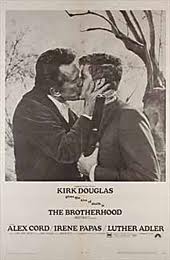
THE BROTHERHOOD
US, 1968, 94 minutes, Colour.
Kirk Douglas, Alex Cord, Irene Papas, Susan Strasberg, Luther Adler, Murray Hamilton.
Directed by Martin Ritt.
The Brotherhood’ was not a commercially successful film from Martin Ritt, director of such fine films as A Man is Ten Feet Tall, Hud, The Spy Who Came in from the Cold, Hombre and Sounder. Now, comparisons with The Godfather are inevitable because of its Mafia subject and similarities of theme and treatment.
Yet The Brotherhood is a good film showing insight into the Mafia, the new generation versus the old, Sicily and America. Kirk Douglas is excellent in the central role, one of his better performances. Director Ritt always develops social settings well so that the drama is played out in real situations and not in a vacuum.
Strong fare but worthwhile.
1. By the end of’ the film, it could be seen that there was much irony in the title of the film. How?
2. "Brotherhood" implies blood relationship, fellowship and the Mafia itself. What did the film show of their inter-relationships?
3. Was the flashback structure of the film effective? What impact did it give to the conclusion?
4. What did you think the relationship between the two brothers was as the film opened?
5. The film opened in Sicily with a mixture of the modern and the old, but focussed on the old, the origins of the Mafia. What insight did these Sicilian sequences give into the Mafia, its origins, its reasons for existence?
6. How did the U.S. skyline contrast with Sicily, the old and the new? How did the film develop this contrast between old and new, the realities of change, growth and progress?
7. What kind of man was the Don? Did the film 'give insight into his character, beliefs, ambitions, superstitions, ruthlessness? How? Comment on the presentation of his marriage, his wife, his love for his daughter, his relationship with Vince, the style of his home, his old friends, his office and, especially, his proud and stately dance at the wedding.
8. How did it emerge that he was old-fashioned in mentality and work, out of touch? Was he necessarily doomed because of this? What was the cause of his downfall?
9. Did he understand the new alignments, the computer world, Vince's ambitions? Why did he stand out against change? Why was he so presumptuous in his trust of old ways and friends?
10. How ugly was his murdering of his father's betrayer? How cruel? Did it change your attitude towards him? Why did he still keep to the old traditional ways of murder, even if it meant flight from the country?
11. Was Vince any less ruthless than his brother, or was he more ruthless? Which was worse, his cold computer-like, intellectual approach to business, extortion and murder or the old, personal cruel vengeance? (Which allowed for the possibilities of change of heart or repentance?). (Why did his wife want to know nothing? Had she a responsibility to know?)
12. Did Vince have any options about killing his brother? Why did he accept?
Do you think that as a person he would be able to live easily with this? Why?
13. Martin Ritt is noted for his ability to present an environment and characters formed by their environment. Does he do so here? How? How effectively?
Brothers Karamazov, The
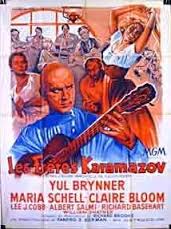
THE BROTHERS KARAMAZOV
US, 1958, 162 minutes, Colour.
Yul Brynner, Maria Schell, Claire Bloom, Richard Baseheart. Lee J. Cobb, William Shatner, Albert Salmi.
Directed by Richard Brooks.
The Brothers Karamazov seems an impossible work to transfer to the screen adequately. Doistoievski1s masterpiece has enormous scope and depth, a story of Russian faith and despair, of man in the face of the evil and good within himself. It would be too much to expect a masterpiece. Neither this version nor a later Russian version are masterpieces. However, once this is said, it can be added that this is an interesting and enjoyable film, with much action and the elements of the great conversations satisfactorily interpreted. (A device that Brooks used successfully in his screen version of Conrad's Lord Jim, 1965).
Yul Brynner is quite effective as Dmitri, the troubled and heroic Karamazov. Most of the other characters seem to overplay their roles but convey the spirit of the work, and certainly the major issues are raised for the audience.
Richard Brooks has adapted many novels and plays such as Cat on a Hot Tin Roof, Sweet Bird of Youth, Lord Jim, In Cold Blood, as well as writing such effective entertainments as The Professionals, The Happy Ending, The Heist. Perhaps not for purists, but a good film for those who enjoy cinema.
1. The film is called after the brothers. What did each of them represent in terms of values of good and evil?
2. Dmitri said he had the Karamazov depravity in his heart; he gambled, was hot-tempered, lusted, yet Fr. Zosima prostrated himself before him. Why? What was evil in Dmitri? What were his good qualities?
3. Ivan was a journalist who theorised about his atheism and its consequences on morality. Were his theories the logical outcome of his beliefs? Was Alexei right in saying that Ivan wanted to believe?
4. Was Alexei meant to represent holiness? Was he a saint? Did his brothers like him?
5. What kind of man was Smerdyakov? Did his father taunt him too much? Why did he absorb Ivan's ideas? Why would he follow Ivan anywhere?
6. What was the attitude of each son to the father?
7. What kind of man was Fyador Karamazov? He said he believed only in what his senses showed him. Yet he was superstitious. His sons thought him a debauched fool. Did he have any redeeming qualities?
8. What kind of woman was Katya? Did she love Dmitri? Did she want to reform him? Possess him? Why did she never notice Ivan and his love? Why did she try to influence Grushenka? Why did she turn against Dmitri and give evidence against him? What was the significance of the Prosecutor's congratulating her after the trial?
9. What kind of woman was Grushenka? Was she right when she said she was dedicated to money? Was she depraved, wicked? What effect did Dmitri have on her? Why was she faithful in memory to the Polish officer? Why did she torment Dmitri? How did she emerge at the end of the film?
10. What was the significance of Dmitri's challenging the officer to a duel, humiliating him? Why did the son react against the Karamazovs and refuse Dmitri's money? What was the significance of Dmitri's final apology?
11. What was the role of money in the film? Discuss the implications of each character's reactions to money.
12. What role did God play in the film? Discuss each character's attitude towards God.
13. How did circumstances change and mature Dmitri's
attitudes? Why did he feel the need for punishment and for atoning for his sins? How 'religious' was his experience?
14. How guilty was Ivan of his father's death? Was he the 'will' who committed the murder? What judgment did the film make on Ivan's theories?
15. It was said that Dmitri was like Russia in temperament and he replied that he did not like himself. What insights into Russia did the film give?
16. The novel makes much of conversations, especially amongst the brothers. Did the film convey the essentials of the novel? Was the film melodramatic, sentimental, cheap or did it retain the dignity of the novel?